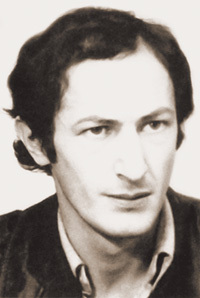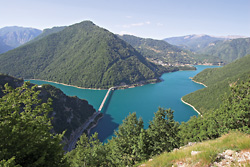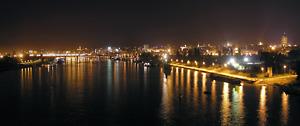Lyre
NOVICA TADIĆ (1949-2011), THE MONK OF CONTEMPORARY POETRY
Scream and Prayer
The editor of his first book in 1974 was Milorad Pavić. Under the swings of dark combs, a terrible city appears before us later, a great devil’s maw, where misfortunes spawn. His poetics of the ugly and images of the terrible open up a new dimension of poetry. The scream of our concentration camp century echoes in those verses. The Lamb appears at the city dump… We could never see Novica in places ”where trash competes”. He never accepted to be a poet who gives himself to awards, or lives from his surname. If he had been buried in the Alley of Deserving Citizens, he would probably have fled from it. But he will eternally have his place next to Nastasijević and Popa, next to Jakšić and Dis
By: Dragan Lakićević
 Perhaps these are the voices of plants oh no Perhaps these are the voices of plants oh no
The growth of the soil along the poles and invasion of bugs
Or the flapping of the wind eternally longing oh no
Early verses of Novica Tadić, at the beginning of his first book of poetry Presences (”Prosveta”, Beograd, 1974), may also be interpreted as the poet’s statement of his poetry: perhaps it is a revelation to the author himself – the voice of a new poet, the growth of the language along the poles of meaning...
It was almost forty years ago. Excluding the Contents, the book had 64 pages. A picture of young Tadić on the front cover, a short biography on the back.
(Early photo: unbuttoned shirt, hair on his chest. At the time, the editor of ”Prosveta” Milan Komnenić gave a witty remark regarding the alleged eroticism of the photo and Novica replied: ”Better with hair than with your waiter-like bowtie!” Komnenić had a picture with a bowtie in his book. – As far as I remember, Tadić never wore a tie. That was also part of his personality, his concept of living.)
Those ”Prosveta’s” ”white-belly books” (as Danojlić described them) resembled notebooks, but the edition was very prestigious.
DIALECT-FREE POET
Novica Tadić was born in 1949 in Plužine near Nikšić.
In his later books, the place of birth was more precise: born in Smriječno near Plužine, or Smriječno, Montenegro... As the official Montenegro later began renouncing its Serbian attributes, including poets, even the greatest one – saying its name became rarer and more difficult for Novica.
Based on the picturesque name of Smriječno, the poet’s home village, we can imagine landscapes of mountains and distances Tadić’s eyes were full of before he set off to school, first to the Nikšić gymnasium, then to Belgrade to study philosophy.
The original and colorful lexicon from the Piva area is almost absent in Tadić’s books. He brought only sagrailo with him, a kind of a shadow and double, a tragicomic language-psychology monster, to be a sagradilo (Serbian: to build) in big cities – a ghost and feature of the unadapted sensitivity in a cruel landscape and nasty society.
In the period of the dialect poetry great upswing, when archaic and provincial vocabulary effectively moved into modern verses and prose with the ”skaz” technique, the poetry of Novica Tadić was linguistically purified, contemporary and urban. He was one of those people from whose speech you could never guess his origin. After all, the Piva area dialect was the exemplary Eastern-Herzegovina dialect of the Serbian language.
The geography in his poetry includes only outlines and toponyms of Belgrade, but more with the contours of the urban, artistic and psychedelic space of an endangered being… His ”Viline Vode” (Fairy Waters) (Belgrade toponym) invokes Hegedušić’s ”Dead Waters” from 1956... The shadow of death follows the ghosts of Tadić’s imagination.
The editor of his book Presences was Milorad Pavić.
FIERY IMAGES
 The ”main character” of the book was the Dark Climber, ambivalent double, a dangerous character or pole of the lyric subject – ”the one sharpening his tongue”, because one can speak/cut with the tongue, although there are other associations too. The ”main character” of the book was the Dark Climber, ambivalent double, a dangerous character or pole of the lyric subject – ”the one sharpening his tongue”, because one can speak/cut with the tongue, although there are other associations too.
Similar to Vasko Popa, Novica in his early lists also builds a register of objects and terms as elements of the ripped apart world which physically surrounds him or optically obsesses him in a phantasmagoric manner: in shoes, index fingers, hen, gloves, pines, night table, tablecloth... The shapes and meanings of those objects are fluid and sometimes take horrifying psychological proportions… He paid special attention to mirrors. Mirrors are reflections of one’s own being – not of the body, but of the internal conception. Mirrors are silent walkers – says the poet – the part of us that quietly follows, warns, stalks, destroys us… Among obsessive beings, he early chose the hen. ”The Hen in the Room” will, in his fourth book Fiery Hen,becomethe metaphor of hell and horror in a brain or a room – chamber of poetry...
The world that transforms and ”changes shapes”, which exists or doesn’t exist together with the world everyone can see, inhabits the poetry of Novica Tadić ever since his first books: Presences, Death in a Chair, Maw...
The number of existing human faces is equal to the number of the many linguistic forms they are named and expressed by. ”Omnifaced” from Death in a Chair is the reality of all characters – beings, sights, the city, wraiths... Jumpies, nibblers, grinners, horrill – are all faces appearing ”under the swings of dark combs”. And those swings of dreams, are they not swings of language, thoughts, mind, spirit? (...)
The collection Death in a Chair was published in 1975 by Matica Srpska.
The poet recognizes all feelings in the reflections of things and in the backside of reality. Reality grins maliciously in these reflections and mirror images. The crow sharpens its beak: everything sharpens its limbs used for singing and screaming, speaking and feeding...
FOUL LANGUAGE PRINCE
With his books Maw, Fiery Hen, Foul Language, The Object of Ridicule, Street, Tadić becomes the prince of the generation, although no one calls the poet of Foul Language and The Object of Ridicule a prince. After his selected Poems had been published in 1988, in the reputable ”Reč i misao” (”Word and Thought”) edition of the ”Rad” publishing house, he became the youngest classic of Serbian poetry. ”Reč i misao” were intended for Pushkin, Dante, Shakespeare, Njegoš ever since 1959... Already the following year, the second edition of Tadić’s Poems was published – about ten thousand copies in total.
Soon ”the world” also heard about Novica. A group of translators discovered our poet in Paris, and Charles Simić (Oberlin College Press) translated his selected poems in 1992 in the US.
The city, ”the great devil’s maw”, where misfortunes spawn, becomes the battlefield of the most influential Serbian poetry. ”The city as hell, the square as a boiler, people as demons” – writes in the poet’s legacy (published by the Annals of Matica Srpska in May 2011). The poetics of the ugly and images of the terrible in Tadić’s verses receive psychological fantastic as a new dimension of poetry. He becomes the protagonist of the drama on the pavement and in the entrance halls, He, ”no one’s son, wraith, solitary bastard”; again one face of the poet and another face of the loner in the big city and cruel world. One of the best Tadić’s poems, ”Viline Vode” was published in the book Maw: the Lamb appears at a big city dump, the poet announces Christ.
In Fiery Hen, Jesus is a needle pillow, and god is a ”dark goddie”. The nihilist is ironic and satiric, the world is the horrill. The best poem: ”They Are Coming to Get Me” – an anthem to the century of arrests. However, in the shadows of the aforementioned, another ”Poem to the Lamb” appeared. The ”Dark Goddie” anticipates the Emperor of Heavens, whose name glows…
The diabolical poems in Foul Language are more convincingly intonated by the role of Job from the Old Testament with the lyrical screams of the poetic subject: ”Oh, Lord, mutilate me, Lord, have mercy on me…” Foul language has the meaning of poisonous, contagious, dangerous language and meaning.
In The Object of Ridicule, like a song, comes another scream of our concentration camp century: ”Birds of Eden sing sweetly in the exotic preserves. The Song of Songs reaches us from the penitentiary stone pit.”
Those were Tadić’s best years. He published his best verses by the age of forty. He won many awards – as if it was easiest to give them to him: one cannot make a mistake there, and he seems to hide them as if ashamed of everything, even the world.
WHERE TRASH COMPETES
 One year, at a festival of young poets in Vrbas, perhaps during the convenient speeches celebrating the Marshal of the state and Party, Novica screamed from the audience. It was a cry of rebellion which boiled in his poems in a lyrical and philosophical manner… The national police was nearby and reacted efficiently. They were fit and well prepared. The poet took the beating as a gentleman. He never complained… Later he barely survived the propellers of the Albanian motorboat which deeply cut him lengthwise at the Ulcinj beach… He never complained about that either, he only wrote a cycle of hospital poems… The hospital staff resembled mythological creatures – partly in life, partly in death... He never complained about not having a job, for living excessively humbly, although all kinds of crisis were only about to begin... One year, at a festival of young poets in Vrbas, perhaps during the convenient speeches celebrating the Marshal of the state and Party, Novica screamed from the audience. It was a cry of rebellion which boiled in his poems in a lyrical and philosophical manner… The national police was nearby and reacted efficiently. They were fit and well prepared. The poet took the beating as a gentleman. He never complained… Later he barely survived the propellers of the Albanian motorboat which deeply cut him lengthwise at the Ulcinj beach… He never complained about that either, he only wrote a cycle of hospital poems… The hospital staff resembled mythological creatures – partly in life, partly in death... He never complained about not having a job, for living excessively humbly, although all kinds of crisis were only about to begin...
When I visited him once in a Belgrade hospital, he told me: ”I dream of verses… I see them… They resemble snakes in tall grass…” The world of his poetry resembles a big hospital of socialism at its end – the inside and the outside of a megalomaniac construction in ghostly ruins. Poems are anamneses: reports of psycho-social knowledge and psycho-emotional images. And all this carrying the lyrical and ethical philosophy of a hypersensitive poet.
At feasts after literary evenings, Novica was the only one who wouldn’t taste anything. He refused the big quantities of food someone else was paying.
”The world is general violence”, states the poem ”The Book”… ”Poetry is a competition in heroism” he wrote about St. Vid’s Day of 1989. (It was Tadić’s contribution to the greatest jubilee of our history.)
Still, his area is the underground, the darkness below the basement stairs, ”where the spider weaves a net under a beam, where trash competes, where the dark is a maniac… and shovel where the bucket is, and shovel where the bucket is, and shovel where the bucket is”. Irony and parody give particular colors and tones to our poet’s sharp images, similar to the best painters of dark sights of the world and soul.
Poetry and darkness distanced him from the Faculty of Philosophy, however not from philosophy itself. The philosophy was both poetical and ethical. The interpreters of its ”abstruse verses” are only about to give it its real name.
”When I started off to Belgrade to study philosophy, my father told me: Ljubo is there, he will help you. If he hadn’t mentioned it, perhaps I would have called him…” (Ljubomir Tadić, close relative, academician, university professor…) The writer of this note was still a young editor when Ljuba Tadić told him: Thank you for taking care of Novica...)
JOB OF BELGRADE
Potukach and the Foolish for Christ look around the social bottom of a perfect society: ”Genius or idiot / Walk the wet pavement…” Ideas glimmer in dark images: reflections of the political reality, ethical cramp, ”poor people” of Belgrade… ”Breaking and gnashing” build a symphony of dreams. Life appears from fragments of dream and reality – life freaky from the outside, complex from the inside… The poem is all and nothing at the same time.
His notes (from his legacy) state: ”Don’t miss reading at least one of my books of poetry as a single poem.” – the entire Tadić’s poetry can be understood as one single poem.
As books went by, as years went by, Tadić’s lyrical subject became more of a martyr, and the city the world of temptation, in which ”no one’s son, a wraith, solitary bastard” can become arrogant in any moment, any step of the way… The poetry replaces a scream with an amen, the urban lament of a nocturnal creature becomes a cry of a god’s man. Religion rules the other half of this poetry: the personal experience of sin receives Christian emotions and depths: ”Sometimes the Lord releases the scum on me”. Job of the Belgrade asphalt recognizes the murmur of his guardian angel’s wing in the street noise.
In his mature years, Tadić’s poetry seems as a subjective echo of the ”Confession Prayer” written by an unknown Serbian poet from the second half of the XIV century. His book of poetry Dark Things could have the same grounds in the verse: ”Thus external darkness inside my dwelling” of Demetrius Kantakouzenus from the second half of the XV century. The medieval language and discourse find a dwelling in the language of Novica Tadić, the most modern poet between the XX and XXI century:
Some lonely places have nothing but grass
the mild wind is moving. Oh, Mother, Virgin Mary,
the stone in my chest whispers Your Name.
Winner of many, almost all awards, he refused to accept the ”Desanka Maksimović” award one May… He suggests sometimes the award is not given to the poet, but the poet to the award… This can be said for many poets, but only the one who refuses an award confirms it… Now it seems to me Nole did it more to distance himself from the general arrogance of the awarded one, than because of the methodology of awarding and accompanying folklore, and in no case because of the writer of ”Bloody Fairytale” and ”I Seek Amnesty”...
DEVIL’S PAL AND GOD
The jubilee edition, the hundredth ”Kolo” of the Serbian Literary Society was prepared in 2008. The ”Kolo” commission invited twenty living writers – writers and scientists, to hand in their manuscripts for ”Kolo”, the most beautiful and most reliable edition in Serbia established in 1892. Among them were: Bećković, Danojlić, Kapor, Kovačević, Albahari... Tadić... The numeration of the ”Kolo” started in 1892 was getting near number 666. The Society was discussing whom to offer the symbolic number. And just after the number 665 had been published, here comes Novica, with his manuscript of Devil’s Pal.
And in this book – ”The Poem”. Only three verses, like an epitaph:
A poem is a stone tomb.
Crucify yourself
and go down into it, if you can.
Most poems in Devil’s Pal are about death. The devil is mentioned in them probably more often than God. However, the poems seem as fragments of a prayer – a series of prayers in a large, unrepeatable poetic service. At the end of the book is the ”Prayer for a Not Shameful Death”. There are no verses in it, and there is no reason to have them – the ultimate Lord’s Prayer of our poet is before the reader: ”
My Creator and my Lord, I have small tombs on the tips of my fingers. This is where I have buried all my wishes. Only one more is still alive: give me, Omnipotent One, a quick and easy death. Send it to me as soon as possible, so I wouldn’t be a shame to my angel. Praise You in heavens. Praise You who care of me too.
The Lord heard his prayers.
He gave him a quick and early death. He was buried at the edge of the Bežanija Cemetery, to rest as he had lived, alone in a crowd, far from the Alley of Deserving Citizens, from which he would probably flee from…
We had a monk of contemporary poetry.
Now we have his books – may they sit in libraries, next to Nastasijević and Popa, who were the closest to him, and next to Jakšić and Dis who, like he did, sang about the cruelty of the world to the gentleness of the human and his soul...
|
